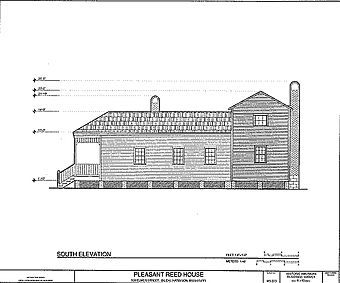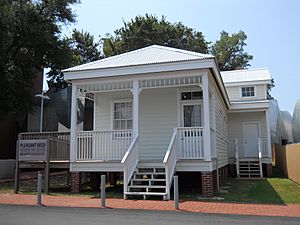Pleasant Reed House facts for kids
|
Pleasant Reed House
|
|
|
Formerly listed on the U.S. National Register of Historic Places
|
|

Drawing of Pleasant Reed House
|
|
| Location | Original site: 306 Elmer Street, Biloxi, Mississippi |
|---|---|
| Built | circa 1887 |
| Architect | Pleasant Reed |
| Architectural style | Vernacular |
| NRHP reference No. | 79001308 |
Quick facts for kids Significant dates |
|
| Destroyed | August 29, 2005 |
| Added to NRHP | January 11, 1979 |
| Removed from NRHP | July 16, 2008 |
The Pleasant Reed House was a unique home located in Biloxi, Mississippi. It was built around 1887 by a man named Pleasant Reed. He was born into slavery but became a free man after the American Civil War. Mr. Reed worked hard as a laborer and carpenter to earn enough money to build this house for his growing family.
This house was more than just a building; it was a symbol of hope and determination. It showed what someone could achieve through hard work and perseverance, even after facing many challenges.
Contents
The Story of Pleasant Reed
Who Was Pleasant Reed?
Pleasant Reed was born in 1854 on a farm in Mississippi. He was born into slavery, which meant he was not free to make his own choices. After the American Civil War ended in 1865, slavery was abolished, and Pleasant Reed became a free man.
He decided to move with his family to Biloxi, a city on the coast of Mississippi. There, he found work as a laborer and used his skills to become a carpenter. He saved his money carefully.
Building a Home
With his earnings, Pleasant Reed was able to build his own house. This was a big achievement for a former slave. The house was a type called a "sidehall shotgun house," which was a common style at the time. It was a special place where his family could live and grow.
A Historic House
Saving the House
Years later, the Pleasant Reed House was recognized as an important part of history. A group called the Biloxi chapter of the Delta Sigma Theta sorority helped save the house. Because of their efforts, it was added to the National Register of Historic Places in 1979. This meant it was officially recognized as a place important to the history of the United States.
Moving to a New Home
In 2003, the house was moved to a new location. It became part of the Ohr-O'Keefe Museum Of Art campus in Biloxi. The museum carefully restored the house, making it look like it did when Pleasant Reed lived there. It was then opened to the public, so people could visit and learn about its history.
Hurricane Katrina and Rebuilding
A Storm's Impact
On August 29, 2005, a very powerful storm called Hurricane Katrina hit the Mississippi coast. Sadly, the Pleasant Reed House was completely destroyed by the hurricane. It was a great loss for the community and for history.
Rebuilding History
Even though the house was gone, its story was not. Museum curators were able to save important old documents and photographs of the house. The museum's leaders decided that the Pleasant Reed House was too important to be lost forever. They voted to rebuild it.
The Interpretive Center
A new building, called the Pleasant Reed Interpretive Center, was built. It is a replica, or exact copy, of the original house. This new center opened to the public on September 29, 2008.
Today, the Pleasant Reed Interpretive Center helps people learn about local African American history. It tells the story of Pleasant Reed and many others who contributed to the community. It stands as a reminder of strength, resilience, and the importance of preserving history.
 | Stephanie Wilson |
 | Charles Bolden |
 | Ronald McNair |
 | Frederick D. Gregory |




